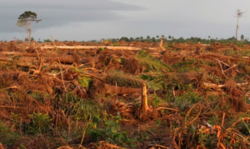
Land cleared for a palm oil plantation is seen in Malen chiefdom in Pujehun district in southern Sierra Leone on October 27, 2011. REUTERS/Simon Akam
By Megan Rowling
LONDON (AlertNet) - Industrial cultivation of oil palm has "wreaked havoc" on rainforests and forest peoples in Southeast Asia and now threatens to do the same in the Congo Basin, a report from the Rainforest Foundation UK warned on Thursday.
Research commissioned by the forest protection group found that half a million hectares of new palm oil projects are getting underway in the Congo Basin rainforest, which will result in a fivefold increase in the area of large-scale palm plantations in the region.
"This is a stark new threat to the second largest contiguous rainforest in the world," the report said.
Around 1.6 million hectares of new developments have been announced in the central African region since 2009, and palm oil companies are actively searching for bigger areas, the report said. Two thirds, or some 115 million hectares, of the total Congo Basin forest area is believed to have suitable soil and climate conditions for growing oil palms, it noted.
The forest area of the Congo Basin spans the borders of six countries: Cameroon, Central African Republic, Republic of Congo, Democratic Republic of Congo, Equatorial Guinea and Gabon.
Between 1990 and 2005, the expansion of oil palm cultivation - often illegal - resulted in the deforestation of 1.1 million hectares in Malaysia and 1.7 million hectares in Indonesia, according to the report. Between 50 and 60 percent of oil palm development in the two countries during this time occurred at the expense of natural forests, it added.
"The human cost of palm oil production has been alienation of forest peoples from their land, land conflicts and the pollution or over-use of water sources," it said. "Oil palm expansion on peat forests has been a major contributor to increased climate change emissions."
Endangered orangutans and Sumatran tigers have also had their habitats cleared in Indonesia, it added.
Despite this, governments in the Congo Basin are welcoming palm oil firms "with open arms", believing they may bring prosperity and jobs to one of the world’s poorest regions, the report said.
But not everyone agrees this is the best model of development for local people. "New large-scale oil palm developments are a major threat for communities, livelihoods and biodiversity in the Congo Basin," said Samuel Nguiffo, director of the Center for Environment and Development (CED) in Cameroon.
"It is absolutely not the appropriate answer to the food security and job creation challenges the countries are facing. Supporting small-scale family agriculture is a better solution," he added.
CALL FOR REGIONAL AGREEMENT
Simon Counsell, the Rainforest Foundation UK's executive director, said African governments are handing out large tracts of rainforest for palm oil development with little or no attention to the likely impacts on the environment or the people who depend on the forest.
"There is a need for regional agreement to ensure that best practices are mandatory for any new oil palm development, including avoiding high conservation-value forests and ensuring the rights of existing forest dwellers are respected,” he urged.
The report provides case studies of three large palm oil developments in the Republic of Congo, Gabon and Cameroon.
In Congo, Atama Plantations - partly owned by Malaysian pipe-coating firm Wah Seong Corporation Berhad (WSC) - plans to establish the largest oil palm plantation in the Congo Basin at up to 180,000 hectares. Much of the area designated for clearance, some of which has already begun, appears to be virgin rainforest that is a habitat for endangered species including chimpanzees and forest elephants, the foundation said.
In a response to the research, WSC said the assessment of its investment in Congo had failed to take into account its projected economic benefits for the nation's people and the expected contribution to gross domestic product of the oil palm industry over the next few decades.
In Gabon, Singaporean agricultural commodities trading giant Olam plans to develop 130,000 hectares of oil palm, increasing the country's commercially farmed land area by 85 percent, which could have significant environmental impacts and uncertain social consequences, especially for traditional forest communities, according to the Rainforest Foundation.
At the same time, it acknowledged that the company is attempting to address some of the potential negative impacts by setting aside the most valuable forest areas, paying a minimum wage, and promising housing, health check-ups and other development assistance for local communities.
Nonetheless, the project will involve the clearance of large areas of secondary tropical forests, resulting in huge carbon dioxide emissions, the report said.
The third plantation project is that planned by a New York-based agribusiness, Herakles Farms, in Cameroon. In a separate report, also released this week, Greenpeace USA said that at least 86 percent of the 73,000-hectare concession area in the Southwest Region of Cameroon is dense natural forest, and cutting it down would release up to 9.5 million tonnes of carbon into the atmosphere.
Some of the potential negative consequences of these large-scale palm oil developments could be avoided if practical steps are taken quickly, the Rainforest Foundation argued.
They include greater transparency of deals between companies and Congo Basin governments, respect for customary land rights and proper consultation with communities, support for smallholder palm oil production, rehabilitation of old plantations and use of degraded land, and enabling non-governmental organisations in the region to play a role in evaluating projects and helping local people speak out about their concerns.
"Much more needs to be done to inform and open public debate within the region," the report concluded.












